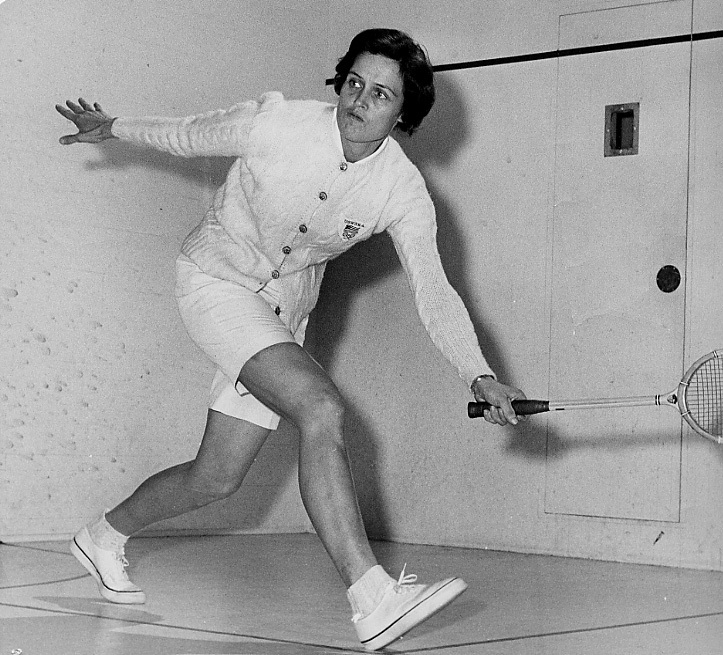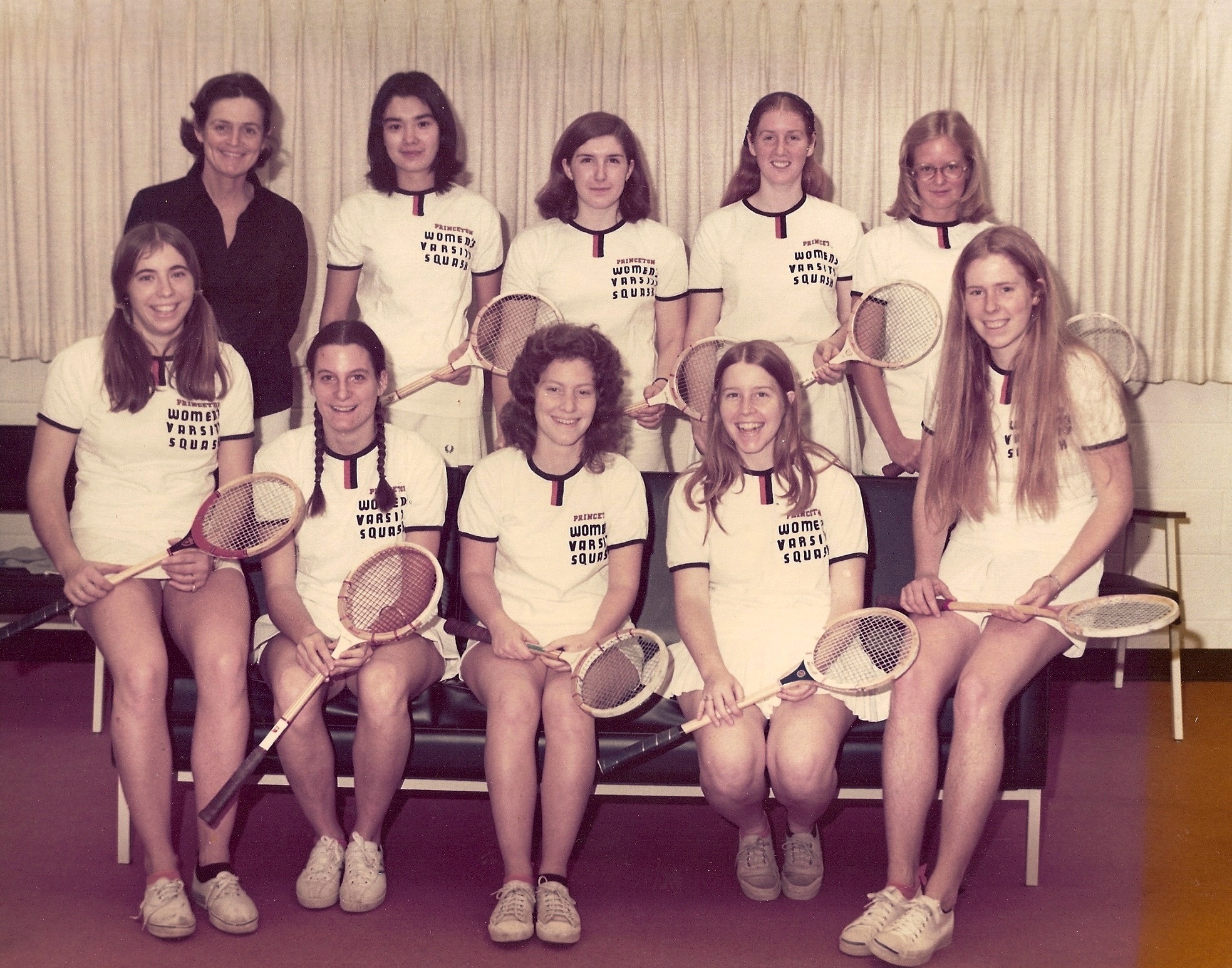
Photos courtesy of Princeton University
A five time national singles champion, who also owned a 117-15 win-loss record as coach of the Princeton women’s squash team that won 12 intercollegiate national team titles during her 20 year coaching career, Betty Howe Constable looms large in the history of US squash. Squash was part of her family lineage—her mother Margaret won three national titles and twin sister Peggy picked up two, and the women’s national team championships became the Howe Cup when Margaret donated the permanent trophy. Betty Constable was the recipient of the Women’s Achievement Bowl in 1978, and one of the first inductees into the US Squash Hall of fame in 2000.
 Betty Constable’s legacy is much more than championships, silver bowls and honors. She was a trailblazer in women’s sports. Outspoken, straight-shooting and a fearsome competitor, she could be an intimidating presence to opponents. But Coach Constable was also funny and nurturing, not just to her three children—Margo, Kacey and Howe—but also to the legions of women who played on the Princeton squash teams. It is in their recollections that Betty Howe Constable’s legacy is most vivid.
Betty Constable’s legacy is much more than championships, silver bowls and honors. She was a trailblazer in women’s sports. Outspoken, straight-shooting and a fearsome competitor, she could be an intimidating presence to opponents. But Coach Constable was also funny and nurturing, not just to her three children—Margo, Kacey and Howe—but also to the legions of women who played on the Princeton squash teams. It is in their recollections that Betty Howe Constable’s legacy is most vivid.
By Beth Rasin
Where do I begin with all the great memories of Coach?! There I was, freshman winter, on the Dillon squash courts with Betty as my teacher learning a new game, squash. Of course at that time, all varsity coaches were also required to teach the masses—how unbelievably lucky I was to have one of the all-time great squash players teach me the basic fundamentals. She seemed to think I had potential, and thus steered me to varsity try-outs the next year. Remember this was 1972, and she desperately needed bodies! Thus began my wonderful life-long love affair with squash, all thanks to Betty “discovering” me on the yellow tinged courts of Dillon.
But it wasn’t all that easy: Literally for hours, she put me on the left wall, where she fed me serve after serve after serve. For beginners, she explained, this was the hardest thing to learn—service return.For every ball I whiffed, she encouraged me and said it would be one mistake behind me; for every error, I would gain a little knowledge and gradually learn to return the ball.
The riotous road trips with Betty were legendary. Before the days of GPS, we would circle around Cambridge and New Haven, trying to find the squash courts and our hapless opponents. While not the greatest navigator, Betty had the magic touch as a coach, and instilled in us a belief that we could win, no matter what our talent. Even the opposing team and their pitiable coach cowered when we showed up at the courts. But we were never cocky—Betty would not allow that behavior. But, oh, how we did win!
CeCe Turner Haydock ‘75
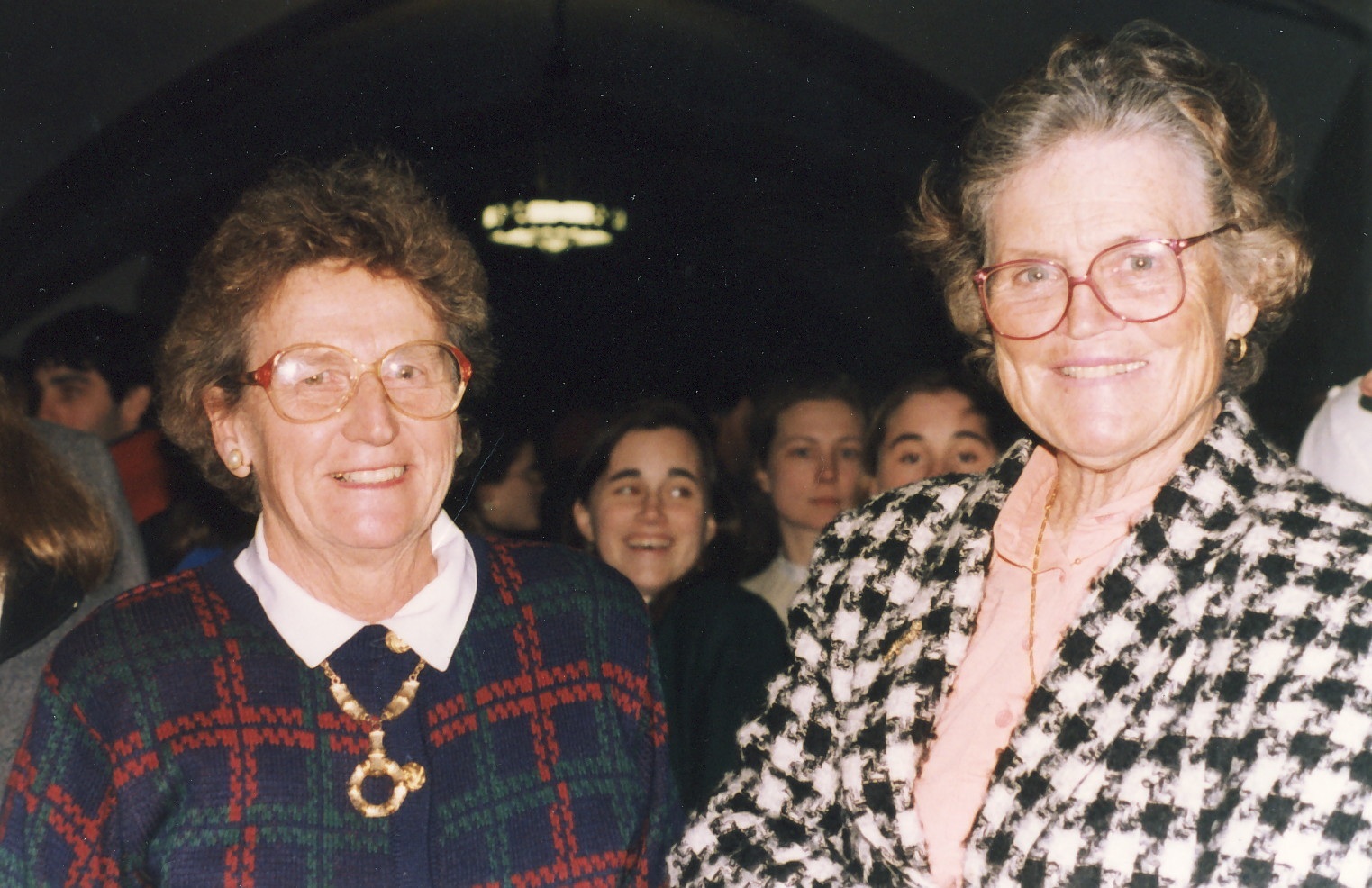
Those were the days! Back in 1974 a freshman girl from Seattle could walk down to the squash courts with an interest in learning the game, and end up four years later as the captain of an undefeated, National Championship team.
At a time when the world was just getting used to Title IX, no girl who played for Betty ever felt like a second-class athlete. She made a place for all of us in Jadwin and at Princeton. Winning helped, of course. I think we were told that her teams won more National Championships than any other Ivy League coach.
Betty Constable had everything to do with the success of the team. She had not studied much politically correct, self-esteem building psychology. She yelled. She told us what we were doing wrong. She didn’t like to lose and she let us know. We learned to play squash and we learned to compete.
She didn’t pay much attention to rules off the court. I learned to enjoy Dubonnet on the rocks with a twist. On road trips on the Connecticut Turnpike, the team traveled in the University’s elongated station wagons with five rows of bench seats. The girl in the last row on the passenger side was always given the quarter and assigned to lob it into the toll basket—on the drivers’ side—as the team went flying through the toll booth at full speed. I wonder how many quarters actually found their way to the coffers of the state? Not many.
She took the team into her home. We got to know her family. She cared about us off the court, but she was not easy on us. She expected—demanded—success. Her toughness drew her players together.
Ginny Farrell Day ‘78
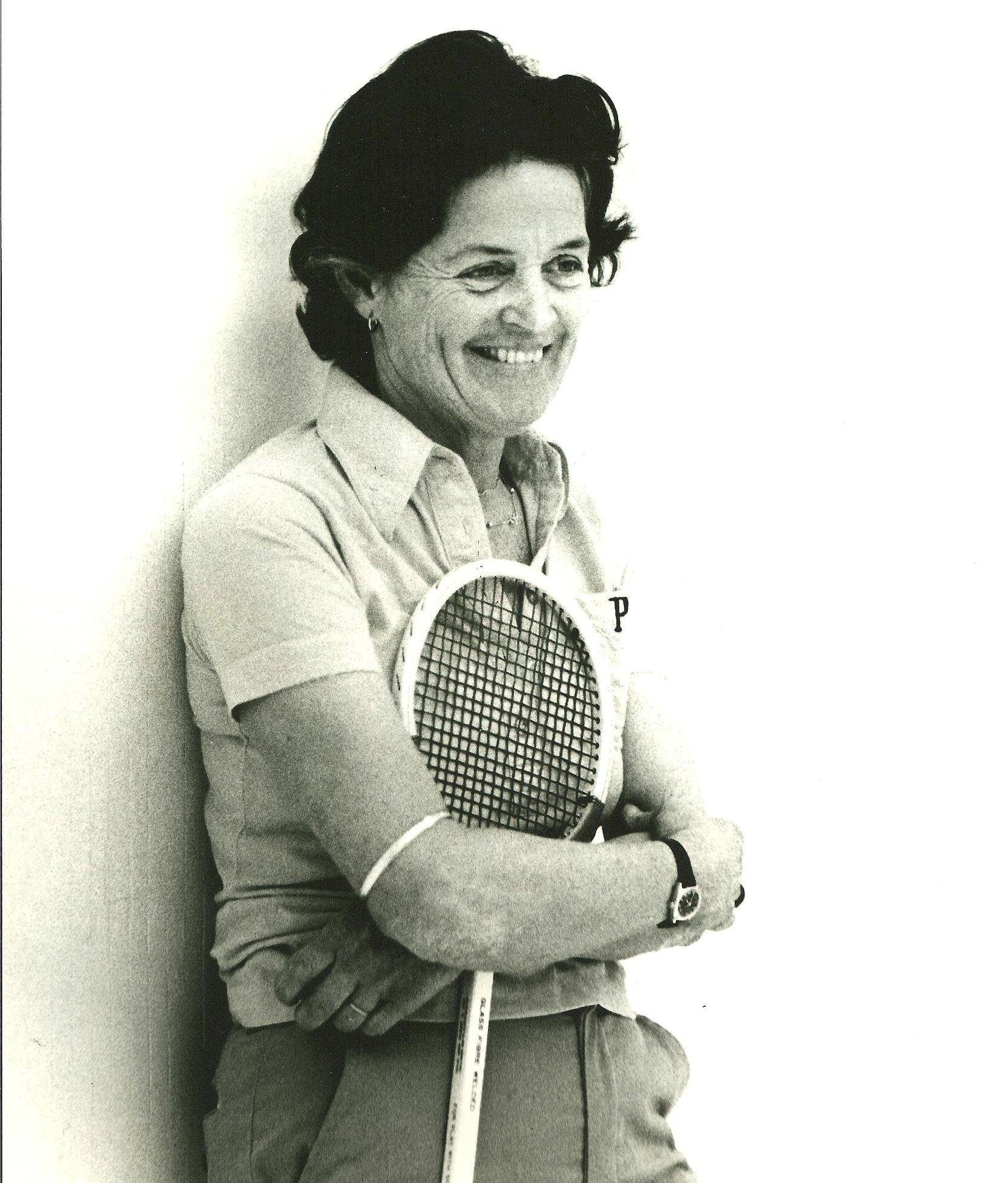 What a coach. Elegant in style with unfettered delight for competition…
What a coach. Elegant in style with unfettered delight for competition…
During practice deep in the bowels of Jadwin, Mrs. Constable (not Betty!) would hang down over the railing and watch one of us muddle along until she couldn’t stand it any more. Then, with twinkling eyes, tortoise headband and dented golden bangle pushed up around her elbow, she’d borrow someone’s racquet and climb down into the court in her khaki pants, maybe even a turtleneck topped with a cardigan.
After three decisive games, Mrs. Constable would exit through the tiny door—only her hair slightly askew. We’d be left rubber legged with exhaustion from trying to scrape lofty serves off the wall, chase down corners that hit only the corner and lobs that died in the backcourt.
During points, Mrs. Constable never left the T. She’d just stretch those long legs, bend at her hipless hips and reach with her leftie that could crack like a whip or kiss like a butterfly. She’d back and back from the ball to pin us into the corner and block our sight and then she’d step in to strike the ball as a snake that knew just the right instant of attack. She always seemed amazed that we were standing flat footed in amazement instead of feeding her the next opportunity in her game of tiger and mouse.
After weeks of jump roping, running star patterns, lifting serves like elevators, swatting balls like flies and dusting walls with gloved fingers, Mrs. Constable would take us on the road for matches. As competitive on the highway as on the court, she rarely allowed another vehicle to pass us. Armed with good technique, clear knowledge of the rules and a mandate to go do our business, we would go into the closed courts with a teammate as sentinel at the 4” X 4” window. Mrs. Constable would race around to collect the game scores so she could motivate the rest of the team to play harder. It was always about the team score and 9-0 was preferred. That said, she was adamant that if we had any doubt that we got the ball in one bounce, we must call it down.
Fannie Cromwell Watkinson ‘79
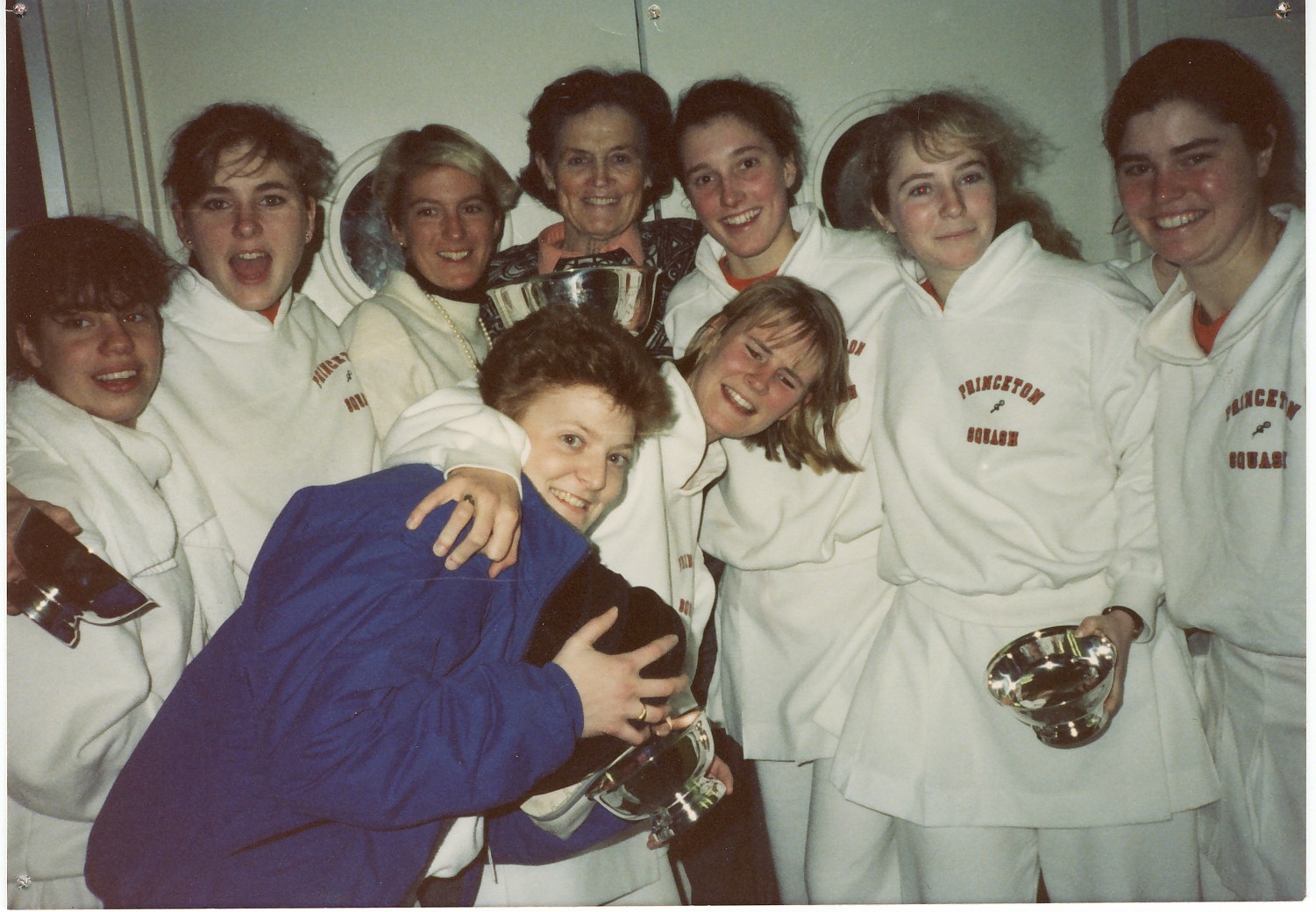
More than her coaching and more than our victories and defeats, what I remember most fondly about Betty is her playful spirit and wonderful sense of humor that kept everything in perspective.
Nancy Gengler ‘80
I remember her teaching us to “hit the ball just like you would swat a fly,” and somewhere I still have the orange flyswatter with a black plastic fly tied to it that she gave all of us one year. I remember her telling us about all the wonderful bargains she found at TJ Maxx—especially the cozy purple socks that she wore on away trips (she bought each of us a pair as well). After college when I was teaching and coaching at Lawrenceville School, Mrs. C. came down to help out with my team and invited me back for soup at her house.
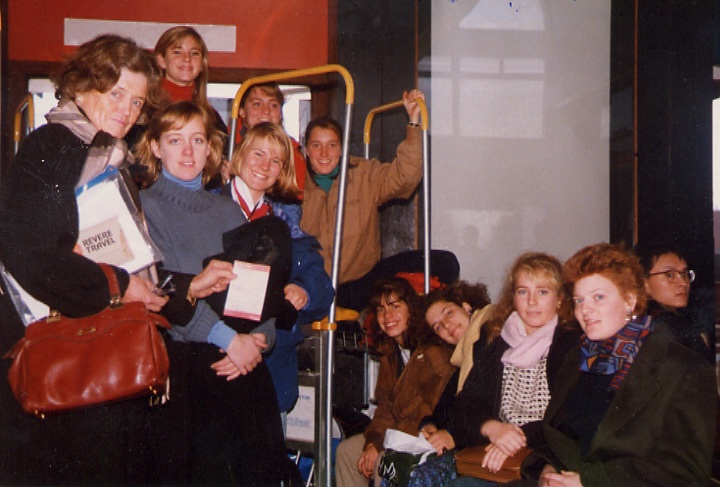 My favorite squash memories occurred my senior year—first when we traveled to England as a team and then culminating in our undefeated national championship…no one who was on that trip will ever forget the only match we won in England—a chugging contest with the women’s team at Loughborough University. After being soundly beaten on the squash courts (none of us really knew how to play softball), we joined our opponents and hosts for a night on the town. At some point that evening a challenge was issued for a rematch of sorts—tag team chugging. As the teams lined up with their glasses in hand, Demer and Mrs. C held the last two spots. The chugging commenced with one girl finishing her beer before the next in line could begin drinking. The first team to have all the beers consumed would win. As the race started it became apparent that the Brits could drink as well as they played squash! However, as we moved down the lines, first Demer and then Mrs. C. stepped up to redeem us all (probably if they had been the only ones playing squash we would have won that match as well!). I will never forget the sight of Mrs. C lifting that cup to her lips, throwing back her head and downing a full beer in one gulp!! Afterwards I remember her saying. “I don’t know what the big deal about chugging is—you just open up your throat and pour it down.” Needless to say Mrs. C ensured that we did not return to the states without at least one championship!!
My favorite squash memories occurred my senior year—first when we traveled to England as a team and then culminating in our undefeated national championship…no one who was on that trip will ever forget the only match we won in England—a chugging contest with the women’s team at Loughborough University. After being soundly beaten on the squash courts (none of us really knew how to play softball), we joined our opponents and hosts for a night on the town. At some point that evening a challenge was issued for a rematch of sorts—tag team chugging. As the teams lined up with their glasses in hand, Demer and Mrs. C held the last two spots. The chugging commenced with one girl finishing her beer before the next in line could begin drinking. The first team to have all the beers consumed would win. As the race started it became apparent that the Brits could drink as well as they played squash! However, as we moved down the lines, first Demer and then Mrs. C. stepped up to redeem us all (probably if they had been the only ones playing squash we would have won that match as well!). I will never forget the sight of Mrs. C lifting that cup to her lips, throwing back her head and downing a full beer in one gulp!! Afterwards I remember her saying. “I don’t know what the big deal about chugging is—you just open up your throat and pour it down.” Needless to say Mrs. C ensured that we did not return to the states without at least one championship!!
Ann Chilton ‘89
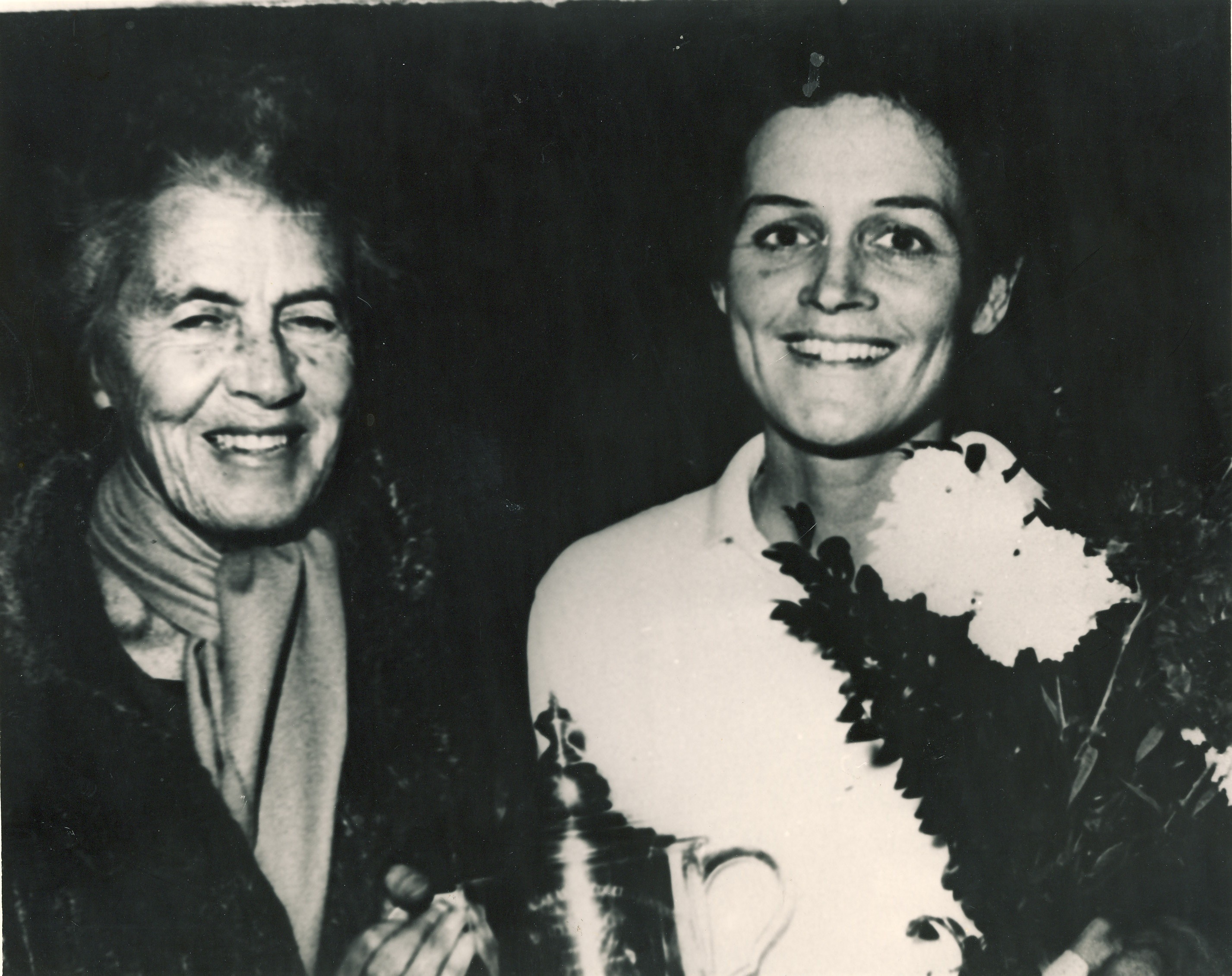 I remember her saying that she played places where it was so cold that you took two balls to play. One was kept between her breasts in her bra and they were switched every several points!
I remember her saying that she played places where it was so cold that you took two balls to play. One was kept between her breasts in her bra and they were switched every several points!
I think the biggest mark she made on me as a player was her fierce will to win. She instilled that. No holds barred. Not being lady-like. You go out there to win. She made that clear. And her simple expectation of success. Setting that expectation and supporting you as you made the effort, went a long way. Of course, she taught me to hit as many reverse corners as possible and to use my butt to push my opponents away. She provided great opportunities—letting me play with the men’s team but also expecting me to be a team player with the women. She was also the coach who first took me to play against internationals. In my senior year we went to England and I had never played overseas before. Again, she seemed to expect that I would be able to hold my own and I did, kind of to my surprise. It gave me more confidence to say that following graduation I would go try my hand at international squash. Before that, I didn’t know what was out there and the trip was just a small taste. I loved her competitiveness, a very combative spirit.
I also did pick Princeton in large part due to her. I liked the idea of being influenced by someone who was a great champion. Winning five national singles made a great impression on me. Being around her helped me to be a champion.
Demer Holleran ‘89


